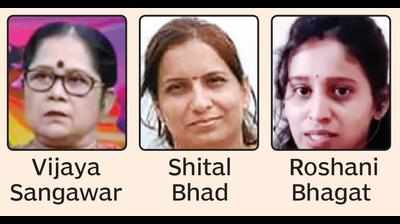- News
- City News
- nagpur News
- Amravati professors patent long lasting rechargeable battery gel
Trending
This story is from September 17, 2021
Amravati professors patent long lasting rechargeable battery gel

Amravati: Three scientists from different colleges in the district worked together on a research project and have been awarded an Indian patent for their research on rechargeable batteries.
Proffesor Dr Vijaya Sangawar from department of physics at the Government Vidarbha Institute of Science and Humanities, professor Dr Shital Bhad from the Smt Narsamma Arts, Commerce and Science College, and professor Roshani Bhagat from Rajarshi Shahu Science College, Chandur Railway, have been granted a patent for research titled ‘Rhodaming dye doped PVA/KSCN reversible, sustainable polymer electrolyte & process of synthesis thereof’.
This is the third patent in the name of Sangawar.
Research on rechargeable batteries is underway throughout the world but required success in this field is not achieved. Dr Vijaya Sangawar decided to invest her time in this field. Research students Bhad and Bhagat started the research in 2009 under the guidance of Sangawar. After success in this research, they applied for a patent in 2019. After complying with the remarks raised by the patent office, the patent was granted on dated August 24.
The research observed that there wasn’t any change in the conductivity of this gel. It remained constant. Hence the research proved that the capacity of this gel is nine years and it is reversible to its original condition by a very simple process.
Hence, this gel could be used effectively in rechargable batteries, as it improves the quality and life span of the battery.
Proffesor Dr Vijaya Sangawar from department of physics at the Government Vidarbha Institute of Science and Humanities, professor Dr Shital Bhad from the Smt Narsamma Arts, Commerce and Science College, and professor Roshani Bhagat from Rajarshi Shahu Science College, Chandur Railway, have been granted a patent for research titled ‘Rhodaming dye doped PVA/KSCN reversible, sustainable polymer electrolyte & process of synthesis thereof’.
This is the third patent in the name of Sangawar.
Research on rechargeable batteries is underway throughout the world but required success in this field is not achieved. Dr Vijaya Sangawar decided to invest her time in this field. Research students Bhad and Bhagat started the research in 2009 under the guidance of Sangawar. After success in this research, they applied for a patent in 2019. After complying with the remarks raised by the patent office, the patent was granted on dated August 24.
In this research, rhodamine dye and potassium thiosynet were mixed in proper percentage with polivinil alcohol polymer and a gel was prepared by a very simple process at low cost. The conductivity of this gel was checked and studied scientifically over nine years. Even after 9 years, the conductivity of the gel was checked and verified.
The research observed that there wasn’t any change in the conductivity of this gel. It remained constant. Hence the research proved that the capacity of this gel is nine years and it is reversible to its original condition by a very simple process.
Hence, this gel could be used effectively in rechargable batteries, as it improves the quality and life span of the battery.
End of Article
FOLLOW US ON SOCIAL MEDIA










